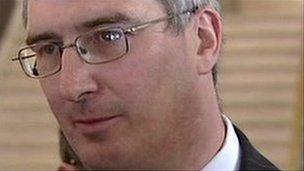UUP 'least influential' assembly party: survey
- Published

Tom Elliott's UUP is claimed to be the least influential party in the assembly
The Ulster Unionist Party is viewed as the least influential party in government, according to a new academic study.
Around 1,200 respondents were surveyed for the study, conducted for Queen's University Belfast by Market Research NI.
It was carried out at the time of the last election and relates to the previous executive when the Ulster Unionists had two ministers to the Alliance's one, David Ford.
More than a third of those surveyed believed the UUP had either not much or no influence on the last executive.
This is slightly worse than the SDLP and Alliance where just over a quarter stated that these parties - with one minister each then - had "not much" or no influence in the Executive.
And just 3.3% of people - less than any other party - said they were "very satisfied" with the UUP's performance in the last executive.
More than four times that many were "not at all satisfied."
Not surprisingly, given the last election results, the DUP scored the highest satisfaction ratings, with almost 10% "very satisfied" with its efforts in the last executive.
The Ulster Unionists had the lowest satisfaction ratings - with 55% of respondents indicating satisfaction.
Dr Garry said this compared to "65% to 73% for the other parties".
Overall, satisfaction for the executive as a whole is 64%.
Complexities
The study was part of Dr John Garry's study of the 2011 assembly election. The survey was designed to shed light on why people vote the way they do.
Dr Garry, writing in the News Letter, suggested that despite the complexities of a five-party shared executive, voters do draw conclusions about individual performances.
Voters perceived that the two biggest parties, the DUP and Sinn Fein, as the most influential in the executive.
Even when the UUP controlled a department, those surveyed suggested the DUP had more influence - perhaps because the DUP was in charge of finance.
Those surveyed suggested the health service had worsened under the UUP minister Michael McGimpsey.
The survey indicated deep dissatisfaction with both health and education.
Around 55% thought education had got worse between 2007 and 2011 - and almost 60% blamed the executive.
The public, however, were just as likely to blame "other factors" for problems in education as it was to blame Stormont.
Given that Sinn Fein controlled the department, it is not surprising that 58% singled the party out for blame regarding education.
Just over 10% of those questioned blamed the DUP.
As for the economy, 67% thought it had got worse under the executive and the two main parties were more likely to be held responsible for this than the others.
However, most of the blame was linked to factors beyond Stormont's control.
Positive feedback
Only around 12% thought things had got better.
There was some positive feedback on the issue of policing and justice.
Between 48 and 58% thought things had improved and around half gave credit to Stormont for this.
The DUP and Sinn Fein got the most credit for "peace, security and stability."
The survey comes amid rumblings of discontent within the Ulster Unionist Party which has had a traumatic 2012, with MLA David McNarry resigning the whip over attempts to sanction him.
The word at Stormont is that the party had a rather grumpy meeting on Monday, with an unflattering newspaper article apparently the catalyst.
Sources told my colleague Yvette Shapiro of "bitter comments, frustration and deep concern" about the direction of the Ulster Unionist Party.
However, she was told there was no open challenge or finger of blame pointedly openly at the leader, Tom Elliott.
The leadership is due for renewal at the end of the month and Mr Elliott has to indicate his intention by the end of next week.
He is expected to go forward again for the job.
At this point, it is a matter of paperwork really but a sharp eye is being kept on the issue by observers.
"Tom is expected to put his papers in," said one source who did also speculate that others may be regretting not standing for the leadership in 2010.
As for the survey, one Ulster Unionist joked that he was thinking of doing his own survey on the newspaper to "find out if the News Letter is influential".
The Ulster Unionists might take some comfort from the survey's attitudes on the union: less than 18% wanted a United Ireland.